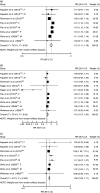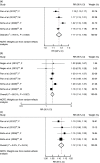Red and processed meat consumption and mortality: dose-response meta-analysis of prospective cohort studies
- PMID: 26143683
- PMCID: PMC10270853
- DOI: 10.1017/S1368980015002062
Red and processed meat consumption and mortality: dose-response meta-analysis of prospective cohort studies
Abstract
Objective: To examine and quantify the potential dose-response relationship between red and processed meat consumption and risk of all-cause, cardiovascular and cancer mortality.
Design: We searched MEDLINE, Embase, ISI Web of Knowledge, CINHAL, Scopus, the Cochrane library and reference lists of retrieved articles up to 30 November 2014 without language restrictions. We retrieved prospective cohort studies that reported risk estimates for all-cause, cardiovascular and cancer mortality by red and/or processed meat intake levels. The dose-response relationships were estimated using data from red and processed meat intake categories in each study. Random-effects models were used to calculate pooled relative risks and 95 % confidence intervals and to incorporate between-study variations.
Results: Nine articles with seventeen prospective cohorts were eligible in this meta-analysis, including a total of 150 328 deaths. There was evidence of a non-linear association between processed meat consumption and risk of all-cause and cardiovascular mortality, but not for cancer mortality. For processed meat, the pooled relative risk with an increase of one serving per day was 1·15 (95 % CI 1·11, 1·19) for all-cause mortality (five studies; P<0·001 for linear trend), 1·15 (95 % CI 1·07, 1·24) for cardiovascular mortality (six studies; P<0·001) and 1·08 (95 % CI 1·06, 1·11) for cancer mortality (five studies; P<0·001). Similar associations were found with total meat intake. The association between unprocessed red meat consumption and mortality risk was found in the US populations, but not in European or Asian populations.
Conclusions: The present meta-analysis indicates that higher consumption of total red meat and processed meat is associated with an increased risk of total, cardiovascular and cancer mortality.
Keywords: Cohort studies; Meat; Meta-analyses; Mortality.
Figures



Similar articles
-
Associations of the consumption of unprocessed red meat and processed meat with the incidence of cardiovascular disease and mortality, and the dose-response relationship: A systematic review and meta-analysis of cohort studies.Crit Rev Food Sci Nutr. 2023;63(27):8443-8456. doi: 10.1080/10408398.2022.2058461. Epub 2022 May 1. Crit Rev Food Sci Nutr. 2023. PMID: 35491892
-
Consumption of red and processed meat and breast cancer incidence: A systematic review and meta-analysis of prospective studies.Int J Cancer. 2018 Dec 1;143(11):2787-2799. doi: 10.1002/ijc.31848. Epub 2018 Oct 3. Int J Cancer. 2018. PMID: 30183083 Free PMC article.
-
Relevance of physical function in the association of red and processed meat intake with all-cause, cardiovascular, and cancer mortality.Nutr Metab Cardiovasc Dis. 2019 Dec;29(12):1308-1315. doi: 10.1016/j.numecd.2019.06.019. Epub 2019 Jun 27. Nutr Metab Cardiovasc Dis. 2019. PMID: 31377183
-
How to Keep the Balance between Red and Processed Meat Intake and Physical Activity Regarding Mortality: A Dose-Response Meta-Analysis.Nutrients. 2023 Jul 29;15(15):3373. doi: 10.3390/nu15153373. Nutrients. 2023. PMID: 37571311 Free PMC article. Review.
-
Processed meat: the real villain?Proc Nutr Soc. 2016 Aug;75(3):233-41. doi: 10.1017/S0029665115004255. Epub 2015 Dec 1. Proc Nutr Soc. 2016. PMID: 26621069 Review.
Cited by
-
Healthfulness Assessment of Recipes Shared on Pinterest: Natural Language Processing and Content Analysis.J Med Internet Res. 2021 Apr 20;23(4):e25757. doi: 10.2196/25757. J Med Internet Res. 2021. PMID: 33877052 Free PMC article.
-
Evidence-based clinical advice for nutrition and dietary weight loss strategies for the management of NAFLD and NASH.Clin Mol Hepatol. 2020 Oct;26(4):383-400. doi: 10.3350/cmh.2020.0067. Epub 2020 Jul 17. Clin Mol Hepatol. 2020. PMID: 32674529 Free PMC article. Review.
-
Dietetics Program Directors in the United States Support Teaching Vegetarian and Vegan Nutrition and Half Connect Vegetarian and Vegan Diets to Environmental Impact.Front Nutr. 2019 Aug 14;6:123. doi: 10.3389/fnut.2019.00123. eCollection 2019. Front Nutr. 2019. PMID: 31475150 Free PMC article.
-
Most Frequently Consumed Red/Processed Meat Dishes and Plant-Based Foods and Their Contribution to the Intake of Energy, Protein, and Nutrients-to-Limit among Canadians.Nutrients. 2022 Mar 16;14(6):1257. doi: 10.3390/nu14061257. Nutrients. 2022. PMID: 35334914 Free PMC article.
-
Animal and Plant Protein Sources and Cardiometabolic Health.Adv Nutr. 2019 Nov 1;10(Suppl_4):S351-S366. doi: 10.1093/advances/nmy110. Adv Nutr. 2019. PMID: 31728490 Free PMC article. Review.
References
-
- Speedy AW (2003) Global production and consumption of animal source foods. J Nutr 133, 11 Suppl. 2, 4048S–4053S. - PubMed
-
- Delgado CL (2003) Rising consumption of meat and milk in developing countries has created a new food revolution. J Nutr 133, 11 Suppl. 2, 3907S–3910S. - PubMed
-
- Walker P, Rhubart-Berg P, McKenzie S et al.. (2005) Public health implications of meat production and consumption. Public Health Nutr 8, 348–356. - PubMed
Publication types
MeSH terms
LinkOut - more resources
Full Text Sources

